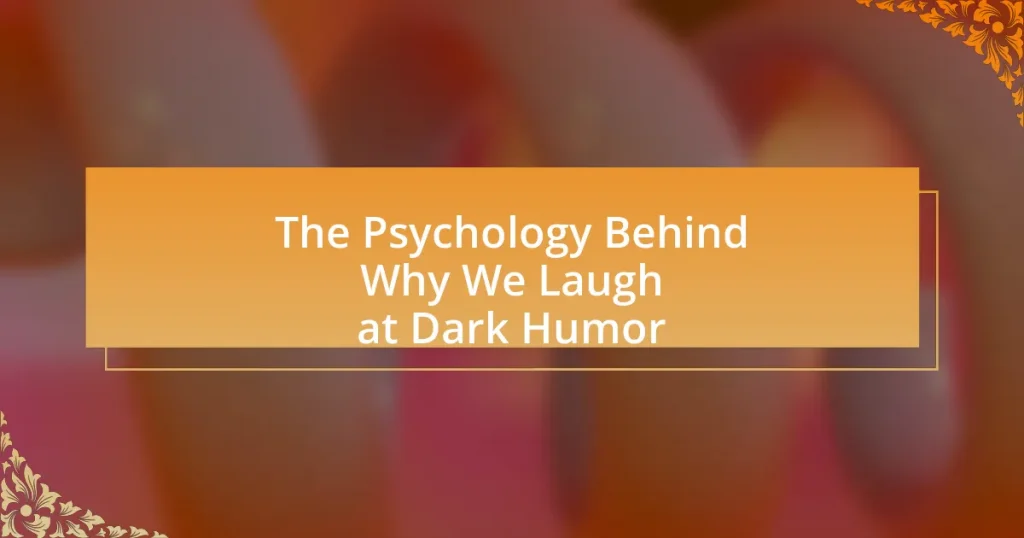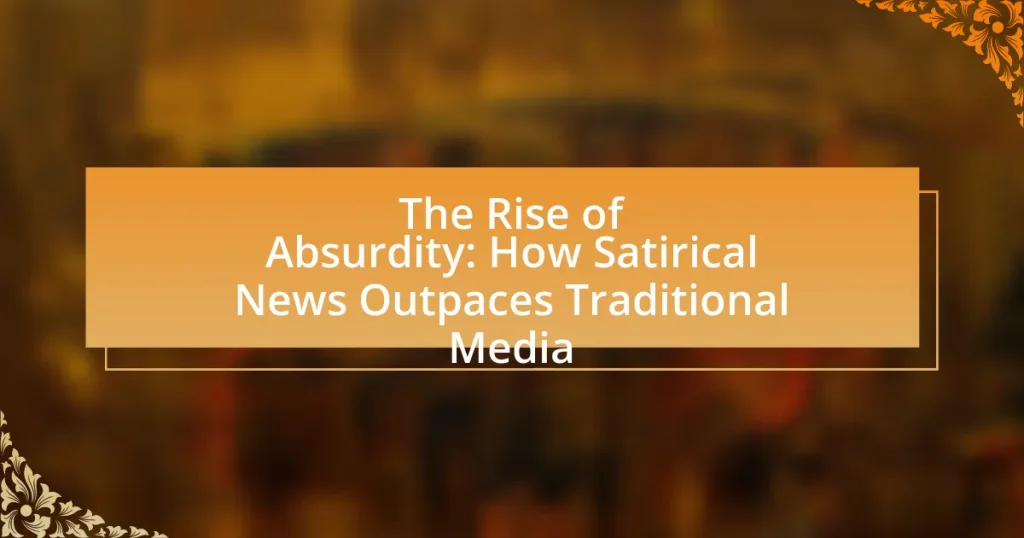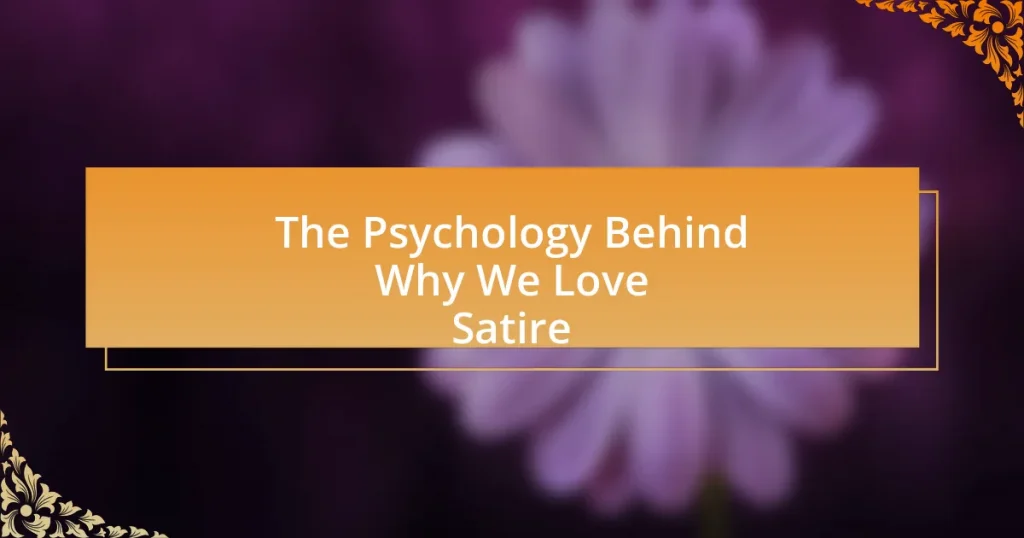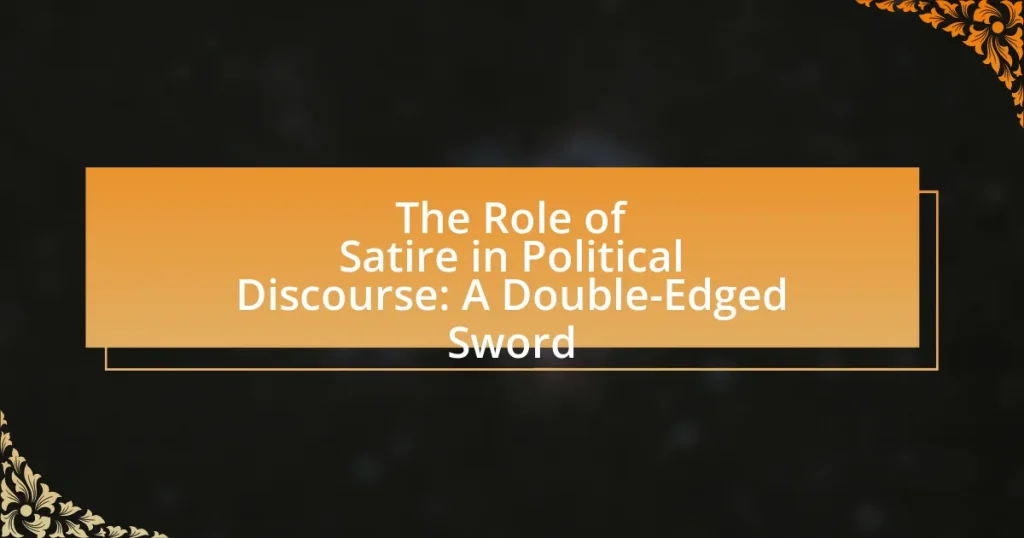The article explores the psychology behind the appreciation of dark humor, focusing on key theories such as incongruity and relief theory. It examines how dark humor allows individuals to confront taboo subjects, providing psychological relief and serving as a coping mechanism for anxiety and discomfort. The article also discusses the characteristics that differentiate dark humor from other types of humor, the influence of cultural factors on its acceptance, and the social dynamics involved in its appreciation. Additionally, it highlights the potential benefits of dark humor, including stress relief and social bonding, while addressing the risks and strategies for navigating its complexities in diverse social settings.
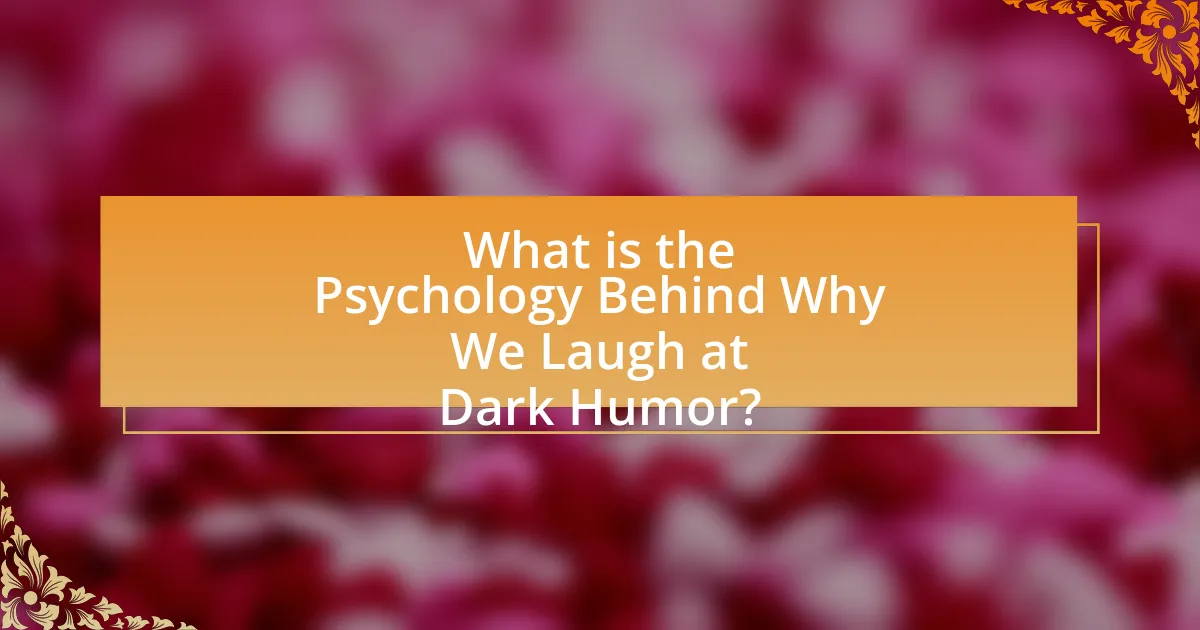
What is the Psychology Behind Why We Laugh at Dark Humor?
The psychology behind why we laugh at dark humor is rooted in the concepts of incongruity and relief theory. Incongruity theory suggests that humor arises when there is a discrepancy between what is expected and what actually occurs, allowing individuals to find amusement in taboo or sensitive subjects. Relief theory posits that laughter serves as a mechanism to release psychological tension associated with distressing topics. Research indicates that dark humor can provide a coping strategy for individuals facing anxiety or discomfort, as it allows them to confront fears in a safe context. A study published in the journal “Cognition and Emotion” by researchers Peter McGraw and Caleb Warren found that people often appreciate dark humor because it enables them to navigate complex emotions and societal norms, ultimately fostering a sense of connection and understanding among those who share similar views on sensitive topics.
How does dark humor differ from other types of humor?
Dark humor differs from other types of humor primarily in its subject matter, as it often addresses taboo or distressing topics such as death, illness, or tragedy. This type of humor relies on the juxtaposition of serious themes with comedic elements, allowing individuals to confront uncomfortable realities in a more palatable way. Research indicates that dark humor can serve as a coping mechanism, helping people process grief or anxiety by providing a sense of relief through laughter. For instance, a study published in the journal “Cognition and Emotion” by researchers Peter McGraw and Caleb Warren found that individuals who appreciate dark humor tend to have higher levels of psychological resilience, suggesting that this form of humor can facilitate emotional processing and social bonding in the face of adversity.
What are the key characteristics of dark humor?
Dark humor is characterized by its ability to find comedy in subjects that are typically considered serious, taboo, or distressing. This form of humor often involves irony, sarcasm, and a juxtaposition of grim themes with lighthearted delivery, allowing individuals to confront uncomfortable realities in a more palatable way. Research indicates that dark humor can serve as a coping mechanism, helping people process trauma or anxiety by reframing negative experiences into something humorous. Additionally, it often relies on shared social norms and an understanding of context, as it can be polarizing and may not resonate with everyone.
Why do some people find dark humor more appealing than others?
Some people find dark humor more appealing than others due to individual differences in personality traits, coping mechanisms, and social contexts. Research indicates that individuals with higher levels of openness to experience and lower levels of agreeableness are more likely to appreciate dark humor, as they tend to have a greater tolerance for ambiguity and discomfort. Additionally, dark humor can serve as a coping strategy for dealing with anxiety and existential fears, allowing individuals to confront taboo subjects in a less threatening manner. A study published in the journal “Personality and Individual Differences” by researchers from the University of Kent found that people who enjoy dark humor often use it as a way to process their own fears and uncertainties, reinforcing the idea that personal experiences and psychological resilience play significant roles in humor preferences.
What psychological theories explain our attraction to dark humor?
Psychological theories explaining attraction to dark humor include the incongruity theory, the relief theory, and the superiority theory. The incongruity theory posits that humor arises from the juxtaposition of unexpected elements, allowing individuals to find amusement in taboo subjects. The relief theory suggests that dark humor serves as a coping mechanism, providing psychological relief from anxiety surrounding serious topics like death or illness. The superiority theory indicates that people may laugh at dark humor to feel a sense of superiority over the misfortunes of others, reinforcing social hierarchies. Research supports these theories, showing that individuals often use dark humor as a way to navigate uncomfortable emotions and societal norms, thereby enhancing their psychological resilience.
How does the incongruity theory relate to dark humor?
The incongruity theory explains that humor arises from the perception of a mismatch between expectations and reality, which is central to dark humor. Dark humor often presents serious, taboo, or distressing subjects in a way that contrasts sharply with societal norms, creating an unexpected twist that elicits laughter. For example, a joke about death may juxtapose a grim topic with a lighthearted punchline, leading to a cognitive dissonance that triggers amusement. This theory is supported by research indicating that humor often relies on surprise and the violation of social norms, as seen in studies by researchers like Thomas Veatch, who found that incongruity is a key element in humor appreciation.
What role does the relief theory play in our laughter at dark humor?
The relief theory posits that laughter serves as a mechanism for releasing psychological tension, which plays a significant role in our appreciation of dark humor. Dark humor often addresses taboo subjects or distressing themes, creating a sense of discomfort or anxiety. When individuals encounter these themes through humor, the relief theory suggests that laughter acts as a coping mechanism, allowing them to alleviate the built-up tension associated with these serious topics. This is supported by the work of Sigmund Freud, who argued that humor provides a way to express repressed thoughts and emotions, thus facilitating emotional release. Consequently, laughter in response to dark humor can be understood as a way to navigate and mitigate the discomfort surrounding sensitive issues.
Why do cultural factors influence our perception of dark humor?
Cultural factors influence our perception of dark humor because they shape the norms, values, and experiences that dictate what is considered acceptable or taboo in humor. Different cultures have varying thresholds for sensitivity regarding topics such as death, illness, and tragedy, which directly affects how dark humor is received. For instance, research indicates that societies with a higher tolerance for discussing death, such as certain Eastern cultures, may find dark humor more acceptable compared to Western cultures, where such topics are often avoided. This cultural context informs individuals’ responses to dark humor, leading to diverse interpretations and reactions based on shared societal beliefs and experiences.
How do societal norms shape our acceptance of dark humor?
Societal norms significantly influence our acceptance of dark humor by establishing boundaries around what is considered acceptable or taboo in comedic expression. These norms dictate the contexts in which dark humor is deemed appropriate, often shaped by cultural, historical, and social factors. For instance, in societies where discussions about death and tragedy are more open, dark humor may be more readily accepted, as seen in cultures that celebrate life through humor even in the face of adversity. Conversely, in more conservative societies, dark humor may be met with disapproval, reflecting a collective discomfort with sensitive topics. Research indicates that humor often serves as a coping mechanism, allowing individuals to navigate complex emotions, and societal acceptance of dark humor can vary widely based on collective attitudes toward the subjects being joked about.
What examples illustrate cultural differences in dark humor appreciation?
Cultural differences in dark humor appreciation can be illustrated through examples from various countries. For instance, in the United States, dark humor often addresses themes like death and tragedy in a way that can be seen as a coping mechanism, as evidenced by popular shows like “The Office,” which includes jokes about serious topics. In contrast, in Japan, dark humor may be less accepted in public discourse due to cultural norms that emphasize harmony and respect, leading to a preference for more subtle forms of humor. Additionally, in the UK, dark humor is prevalent in comedy, with shows like “Blackadder” showcasing a more open approach to discussing grim subjects, reflecting a cultural tendency to confront discomfort through satire. These examples highlight how cultural contexts shape the acceptance and expression of dark humor, influencing what is considered funny or inappropriate.
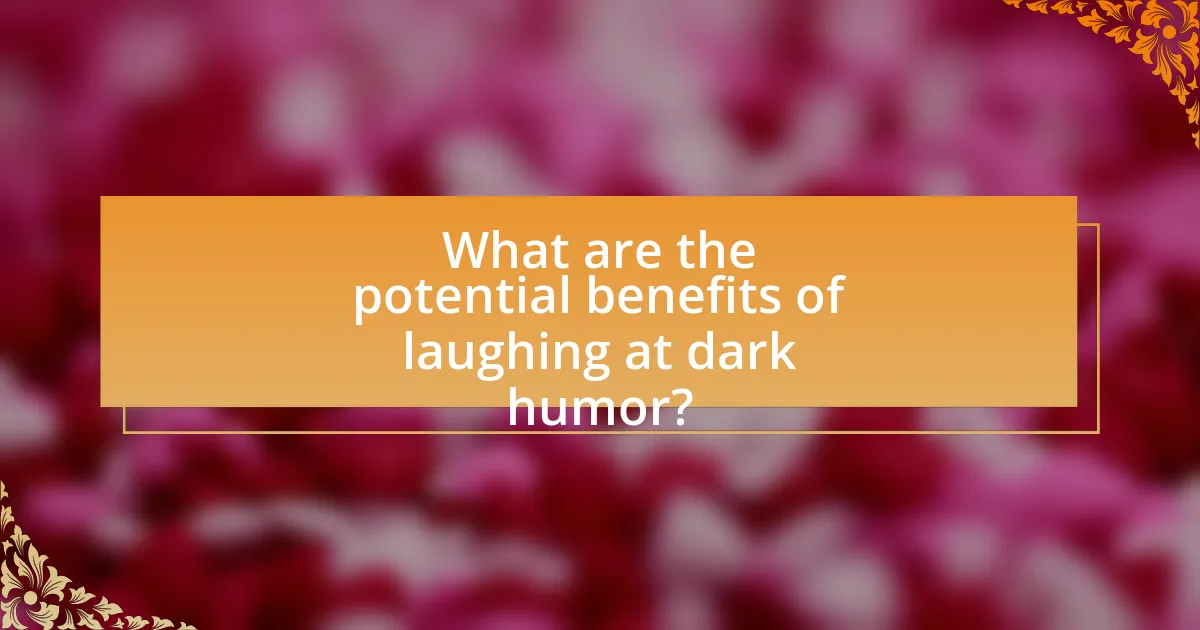
What are the potential benefits of laughing at dark humor?
Laughing at dark humor can provide several psychological benefits, including stress relief, coping mechanisms, and social bonding. Research indicates that humor, particularly dark humor, can serve as a coping strategy for individuals dealing with difficult or taboo subjects, allowing them to process complex emotions and experiences. A study published in the journal “Personality and Individual Differences” by researchers Rod A. Martin and others found that individuals who appreciate dark humor often exhibit higher levels of psychological resilience, suggesting that such humor can facilitate emotional regulation. Additionally, sharing dark humor within social groups can strengthen interpersonal connections, as it often involves a shared understanding of societal taboos, fostering a sense of camaraderie among those who engage with it.
How can dark humor serve as a coping mechanism?
Dark humor can serve as a coping mechanism by allowing individuals to confront uncomfortable or distressing topics in a less threatening manner. This form of humor provides psychological distance from painful experiences, enabling people to process their emotions and reduce anxiety associated with those experiences. Research indicates that engaging with dark humor can activate the brain’s reward system, releasing dopamine, which enhances mood and promotes resilience in the face of adversity. For instance, a study published in the journal “Cognitive Processing” found that individuals who appreciate dark humor tend to have higher levels of psychological resilience, suggesting that it can be an effective tool for managing stress and trauma.
What psychological benefits can arise from engaging with dark humor?
Engaging with dark humor can provide several psychological benefits, including stress relief, coping mechanisms for trauma, and enhanced social bonding. Research indicates that dark humor allows individuals to confront uncomfortable topics in a less threatening manner, which can reduce anxiety and promote emotional resilience. For instance, a study published in the journal “Personality and Individual Differences” by researchers Rod A. Martin and others found that individuals who appreciate dark humor often exhibit higher levels of psychological well-being and lower levels of anxiety. This suggests that dark humor can serve as a valuable tool for processing difficult emotions and fostering connections with others who share similar coping strategies.
How does dark humor help in processing grief or trauma?
Dark humor aids in processing grief or trauma by providing a coping mechanism that allows individuals to confront uncomfortable emotions in a less threatening manner. This form of humor can create psychological distance from painful experiences, enabling people to discuss and reflect on their grief without becoming overwhelmed. Research indicates that humor, including dark humor, can activate the brain’s reward system, releasing endorphins that promote feelings of well-being, which can be particularly beneficial during times of distress. Additionally, a study published in the journal “Psychological Science” by researchers including Rod A. Martin found that humor can facilitate emotional regulation, helping individuals to manage their feelings more effectively.
What social dynamics are involved in the appreciation of dark humor?
The appreciation of dark humor involves social dynamics such as in-group versus out-group distinctions, shared experiences, and coping mechanisms. Individuals often use dark humor to bond with others who share similar values or experiences, creating a sense of belonging. Research indicates that people are more likely to appreciate dark humor when they perceive it as a way to confront taboo subjects, thereby reducing anxiety around those topics. For example, a study published in the journal “Cognition and Emotion” by researchers Peter McGraw and others found that individuals who share a common understanding of the underlying themes in dark humor are more likely to find it funny, as it fosters social cohesion and mutual understanding.
How does group identity influence the enjoyment of dark humor?
Group identity significantly influences the enjoyment of dark humor by shaping the context in which individuals interpret and respond to such humor. Individuals who share a common group identity, such as cultural, social, or political affiliations, often find dark humor more enjoyable because it reinforces in-group solidarity and shared values. Research indicates that humor can serve as a coping mechanism for groups facing adversity, allowing members to bond over shared experiences and challenges. For instance, a study published in the journal “Personality and Social Psychology Bulletin” by McGraw and Warren (2010) found that individuals are more likely to appreciate dark humor when it aligns with their group’s experiences or beliefs, as it can provide a sense of relief and validation in the face of difficult topics.
What role does shared laughter play in social bonding through dark humor?
Shared laughter plays a crucial role in social bonding through dark humor by fostering a sense of connection and mutual understanding among individuals. When people engage in dark humor, they often navigate sensitive or taboo subjects, which can create a unique bond as they collectively confront discomfort. This shared experience of laughter serves as a social lubricant, reducing anxiety and promoting feelings of acceptance within the group. Research indicates that laughter triggers the release of endorphins, enhancing mood and reinforcing social ties. A study published in the journal “Personality and Social Psychology Bulletin” by McGraw and Warren (2010) found that individuals who share laughter over dark humor report feeling closer to one another, highlighting the importance of shared experiences in strengthening interpersonal relationships.
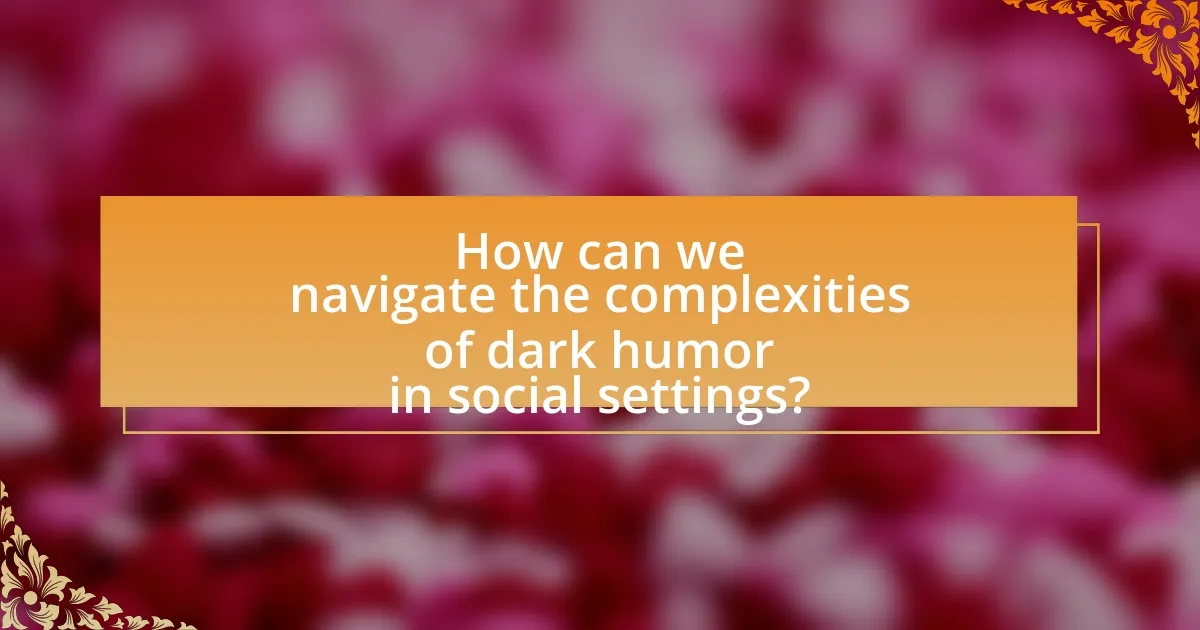
How can we navigate the complexities of dark humor in social settings?
To navigate the complexities of dark humor in social settings, individuals should assess the audience’s sensitivity and context before sharing such humor. Understanding that dark humor often involves taboo subjects, it is crucial to gauge the comfort levels of those present, as reactions can vary significantly based on personal experiences and cultural backgrounds. Research indicates that humor can serve as a coping mechanism, but it can also alienate or offend if not appropriately tailored to the audience. Therefore, employing active listening and observing non-verbal cues can help determine whether dark humor is suitable, ensuring that it fosters connection rather than discomfort.
What are the risks associated with using dark humor?
The risks associated with using dark humor include potential offense to individuals or groups, reinforcement of negative stereotypes, and desensitization to serious issues. Dark humor often targets sensitive subjects such as death, illness, or tragedy, which can alienate or hurt those affected by these topics. Research indicates that humor can perpetuate harmful stereotypes; for instance, a study published in the Journal of Personality and Social Psychology found that jokes about marginalized groups can reinforce prejudiced attitudes. Additionally, frequent exposure to dark humor may lead to desensitization, diminishing empathy towards real-life suffering, as noted in psychological studies on humor and emotional response.
How can dark humor be misinterpreted in diverse audiences?
Dark humor can be misinterpreted in diverse audiences due to varying cultural backgrounds, personal experiences, and social contexts. Different cultures have distinct thresholds for what is considered acceptable humor, leading to potential offense or misunderstanding when dark humor is presented. For instance, a joke about death may be seen as humorous in one culture but deeply offensive in another, as evidenced by research indicating that humor is often shaped by cultural norms and values (Martin, R. A., 2007, “The Psychology of Humor: An Integrative Approach”). Additionally, individuals with personal experiences related to the subject matter of the humor may react negatively, as they might find the content triggering rather than funny. This variability in interpretation highlights the complexity of humor and its reliance on shared understanding and context.
What strategies can help avoid offending others with dark humor?
To avoid offending others with dark humor, individuals should assess their audience’s sensitivities and context before sharing such jokes. Understanding the background, beliefs, and experiences of the audience can help gauge what may be considered offensive. For instance, research indicates that humor is often subjective and can vary significantly across different cultures and social groups, highlighting the importance of context in humor appreciation. Additionally, using self-deprecating humor or focusing on absurdity rather than sensitive topics can mitigate the risk of offending others. This approach aligns with findings from psychological studies that suggest humor is more acceptable when it does not target vulnerable groups or sensitive subjects directly.
What practical tips can enhance our understanding of dark humor?
To enhance understanding of dark humor, individuals should familiarize themselves with its psychological foundations, including the concepts of incongruity and relief theory. Incongruity theory suggests that humor arises from the juxtaposition of unexpected elements, while relief theory posits that dark humor allows for the release of pent-up emotions related to taboo subjects. Engaging with diverse media that includes dark humor, such as films, literature, and stand-up comedy, can provide context and examples of its application. Additionally, discussing dark humor in a safe environment can facilitate understanding and help individuals navigate the boundaries of appropriateness. Research indicates that exposure to dark humor can improve coping mechanisms in stressful situations, as noted in studies by researchers like Peter McGraw and his team, who explored the cognitive processes involved in humor appreciation.
How can we better appreciate dark humor while being sensitive to others?
To better appreciate dark humor while being sensitive to others, individuals should prioritize understanding the context and the audience’s feelings. Recognizing that dark humor often touches on sensitive subjects, it is essential to gauge the emotional state and backgrounds of those present. Research indicates that humor can serve as a coping mechanism, but it can also alienate or offend if not approached carefully. For instance, a study published in the journal “Personality and Individual Differences” by researchers from the University of Kent found that individuals who appreciate dark humor often have higher levels of psychological resilience, suggesting that context matters significantly. Therefore, being mindful of the setting and the potential impact of the humor on others can enhance appreciation while maintaining sensitivity.
What resources are available for exploring dark humor responsibly?
Resources for exploring dark humor responsibly include academic journals, books, and online platforms that focus on humor studies and psychology. Notable academic journals such as “Humor: International Journal of Humor Research” provide peer-reviewed articles that analyze the psychological aspects of dark humor. Books like “The Humor Code” by Peter McGraw and Joel Warner delve into the science of humor, including dark humor, offering insights into its social and psychological implications. Online platforms like TED Talks feature speakers who discuss the boundaries of humor and its effects on society, providing a broader context for understanding dark humor responsibly. These resources collectively contribute to a well-rounded exploration of dark humor while emphasizing the importance of context and audience sensitivity.
